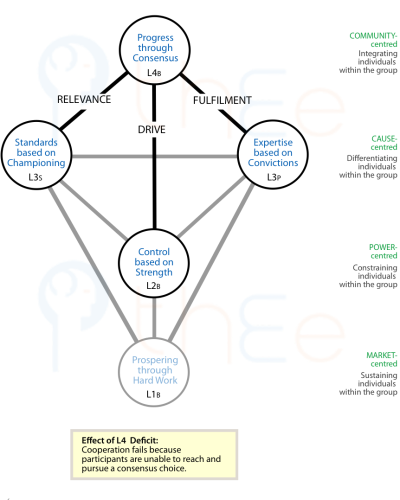Consensus on Goals: L4 Choices
Progress requires Mutuality
Joint endeavours dependent on cooperation require a specific focus on developing and sustaining consensus. It is evident that community-centred principles like mutuality, reciprocity, compromise and fairness are required if the process is to be managed effectively. The challenge at this Level is to integrate individualist choices in order that the common goal can be genuinely experienced as the individual’s goal. This only occurs if participants reach a sufficient degree of agreement on both means and ends.
Review: Community-centred Principles from a purely personal perspective.
 Tension in Cooperation
Tension in Cooperation
Does L4-Consensus imply a Participant focus or a Shared-Endeavour focus or both?
The consensus includes each agreeing the strategy for the whole group as well as allocating roles and tasks to different Participants. All aspects of this allocation must take account of the positions, preferences and powers of the Participants. At the same time it must be directly focused on forwarding the Shared Endeavour.

As consensus is a continuing synthesis of the interests of Participants and the Shared endeavour, the Centre is balanced: L4B
Influences in Cooperation
Cooperation-dependent projects are mediated and driven by the expertise (L3) &/or the strength of the protagonists (L2). So choices to ensure consensus (L4) do not need to link directly to prospering (L1).
 Explain the Picture
Explain the Picture
Drive: L4 ↔ L2
Protagonists bring their power into play to participate in a way that drives consensus. Gains and losses are being continuously weighed, and any continual loser in the supposed consensus will soon withdraw, explicitly or implicitly. As a result, the reverse flow of influence is also required: cooperation based on consensus must drive and develop the strength of the participants.
The Channel is therefore labelled: Drive (L4B ↔ L2B).
Relevance & Fulfilment: L4 ↔ L3
Cooperative processes are also highly sensitive to specialist issues. The competence and professionalism of participants must be respected and supported.
Unless consensus choices link in some way to desired standards, they will tend to be ignored. Similarly, if current standards are not relevant to the consensus, individuals are unlikely to wish to participate. So the Channel here is labelled: Relevance (L4B ↔ L3S).
People are fulfilled through cooperative efforts in which their convictions are aligned with the group’s consensual decisions. Consensus and progress are likely to be rapid and gratifying if they provide opportunities for professionalism to be applied. So the Channel between consensus and expertise is labelled: Fulfilment (L4B ↔ L3P).
 More on Using Experts
More on Using Experts
Harnessing individual experts (or specialised organizations) to reach consensus is vital. It often fails where the controlling agency is in government and distant from implementation. Central HQ will be barely aware of details, focus on the program will be diffused, and people locally will claim not to understand what is required of them.
In the absence of Relevance and Fulfilment, the cooperative endeavour loses out in two ways:
- it cannot support the wise use of power through the L3 → L2 Justification and Obligation Channels; and
- it cannot by-pass the power-centred level (L3 → L1) and produce Focus and Improvement directly.
The result will be that the Drive Channel (L4 → L2) has to be the sole mode of implementation. This greatly weakens progress of the group e.g. within a firm: a cluster of business units or its organizational divisions.
Application of brute force (L2) will involve manipulation, bribery, threats and intimidation—choices that are ethically dubious and invariably activate negative responses, overtly and covertly. It is safe to say that the extent and quality of implementation will suffer and standards generally will fall due to the distraction.
Limitation
So far choices recognize «the greater good» i.e. the Shared endeavour, as important and meaningful; and all participants see cooperation as essential to their self-interest. However, no Level up to this point demands that the greater good be regarded as paramount.
Yet in all cooperative endeavours, some self-sacrifice is usually, or at least potentially, required to speed progress, strengthen consensus and make cooperation maximally effective.
THEE Note:  This requirement is intrinsically communalist i.e. it assumes that an individual’s primary ethical obligation is to meet group needs and aspirations. Note that communalism is teleological i.e. ethical choice is based on pursuing good purposes. So the remaining three Levels attempt to put the good of the shared endeavour first: initially by engendering solidarity and trust (L5), then by helping participants understand and think clearly (L6), and finally by providing assurance that any harm is minor or self-limited (L7).
This requirement is intrinsically communalist i.e. it assumes that an individual’s primary ethical obligation is to meet group needs and aspirations. Note that communalism is teleological i.e. ethical choice is based on pursuing good purposes. So the remaining three Levels attempt to put the good of the shared endeavour first: initially by engendering solidarity and trust (L5), then by helping participants understand and think clearly (L6), and finally by providing assurance that any harm is minor or self-limited (L7).
Originally posted: July 2009
